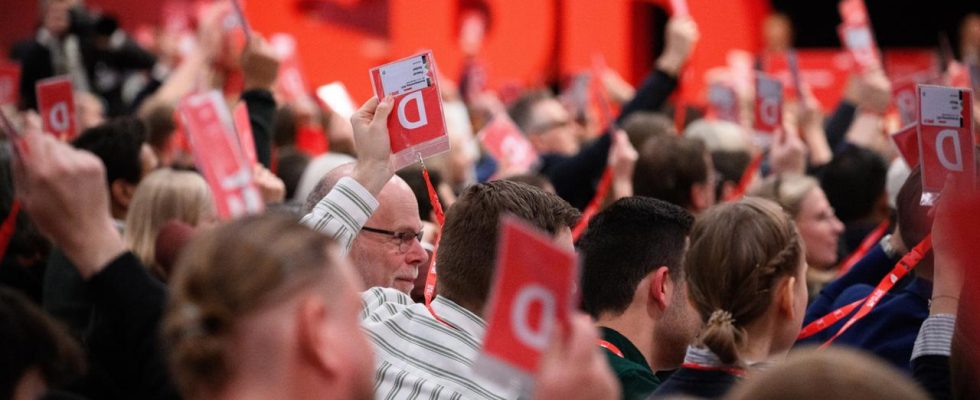In order to resolve the current budget crisis, the SPD is counting on suspending the debt brake in the coming year. The party congress unanimously accepted a corresponding proposal from the party executive committee.
Olaf Scholz did not want to use the word “debt brake” at the SPD party conference – the Chancellor remained vague on the point in his celebrated speech. He once again tried to formulate that he wanted to “give people confidence that it will succeed.”
Immediately after the Chancellor’s appearance, the delegates unanimously accepted a proposal from the party executive committee, which also envisages the suspension of the debt brake for 2024. However, the wording could leave room for interpretation: “Constitutionally stipulated scope for the budget” must be used in the interests of the population, the paper says. Politically, the war against Ukraine creates the prerequisites for an emergency that would enable increased borrowing.
Party leader Saskia Esken emphasized: “We cannot manage the crisis from the normal budget.” That is why the exception rule for the debt brake must be applied again. The SPD is not prepared to finance the means to deal with the war in Ukraine and its consequences through cuts in the social budget.
Lindner remains – so far – with no
There are no clear red lines drawn in the decision – because Scholz first has to negotiate with Vice Chancellor Robert Habeck from the Greens and his Finance Minister Christian Lindner from the FDP about how to proceed. However, the motion that has now been passed makes it clear that the SPD advocates the establishment of a special fund in which expenditure for Ukraine outside the budget is summarized.
It is uncertain whether it will be implemented, as Lindner in particular has recently made it clear again and again that he is not convinced by the arguments for suspending the debt brake. The three traffic light peaks are struggling to plug a 17 billion euro hole in the 2024 budget and to enable billions in investments in climate protection and the modernization of the economy in the coming years.
The FDP wants to achieve this solely through cuts in social areas, among other things. The SPD and the Greens, on the other hand, want to take out loans in order to avoid excessively drastic rounds of austerity.
Mützenich hopes for a quick breakthrough
SPD parliamentary group leader Rolf Mützenich hopes for a fundamental agreement before the turn of the year. In his party conference speech, he warned against going into the coming year without a fundamental agreement on the federal budget. A Bundestag decision is no longer possible before the end of the year. But everything must now be done to at least give security to those who depend on the resources, said Mützenich.
Until a decision is made in the Bundestag, the so-called provisional budget management would apply from January. Then, for the time being, only expenses that are necessary to maintain administration and fulfill legal obligations are possible.
SPD wants to fundamentally reform the debt brake
Yesterday, the delegates at the SPD party conference had already spoken out in favor of a fundamental reform of the debt brake anchored in the constitution: “We reject rigid limits on borrowing by the federal and state governments, as we currently find in the constitution,” it says the key motion of the party executive committee passed yesterday. “They prevent investments and impair the state’s ability to act.”
Union remains in denial
The Union is opposed to easing the debt brake. Most recently, Saxony’s Prime Minister Michael Kretschmer pointed out the great potential for savings in citizens’ money. “If, for example, a million more citizens’ benefit recipients were to work, 30 billion euros could be saved every year. We are ready for measures that lead to this, but not for weakening the debt brake,” said the CDU politician to “Welt am Sonntag” .
The Prime Minister of North Rhine-Westphalia, Hendrik Wüst, warned against solving the current problems on credit. “I am very clear on this: the debt brake protects the young generation from the overreach of those in power today.” There is currently not enough talk about making a profit. “Where does this somnambulistic certainty come from that our children will have smaller problems than us? Where does the certainty come from that it will be easier for them to earn the money that we spend today?” asked the CDU politician in an interview with the news agency dpa. “Every generation should get by with the money they are able to earn.”
Experts criticize past inaction
The abolition of the debt brake is also controversial among experts: The director of the German Economic Institute, Michael Hüther, told the dpa: “The traffic light and the previous governments have neglected to prepare the country for the future, and they have constructive discourses about possible and meaningful reforms of the debt brake were prevented.” Economist Monika Schnitzer told the “Rheinische Post” that careful consideration must be given to whether the debt brake could be suspended again in 2024.

